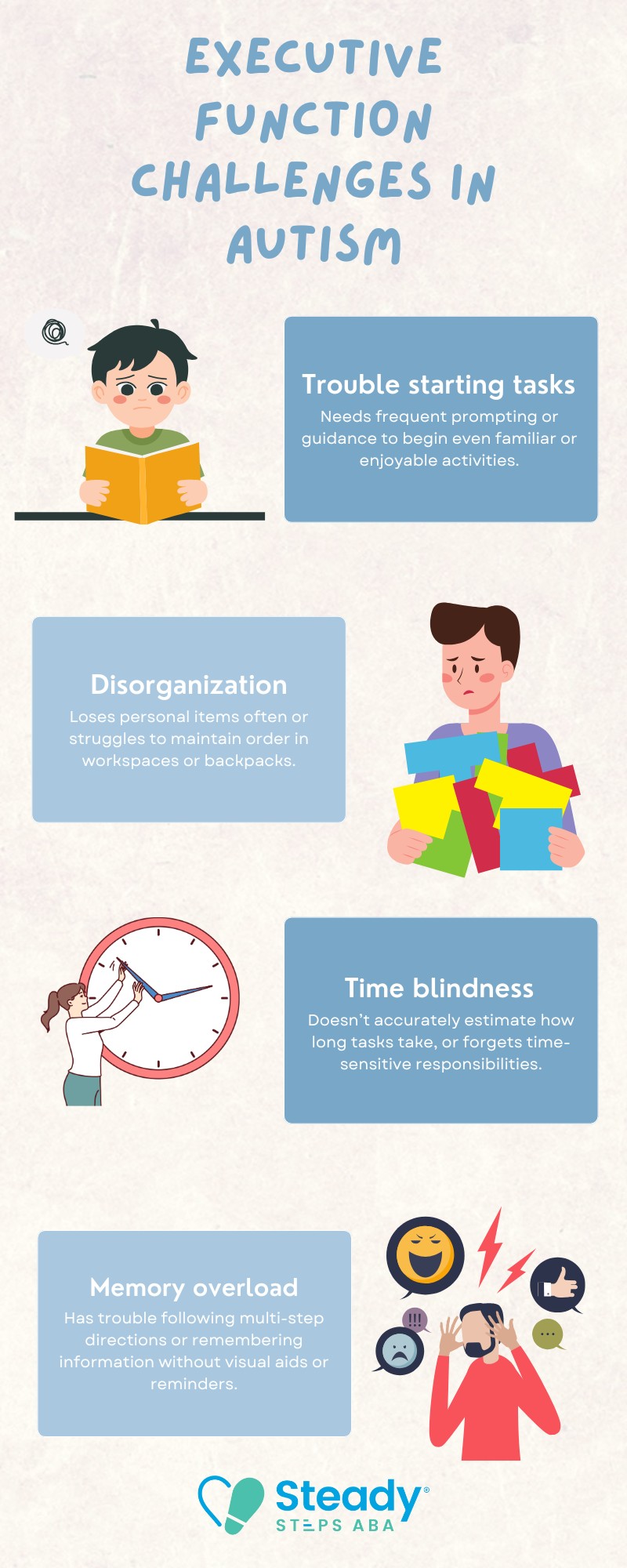Key Points:
- Children with autism often face unique challenges with executive functioning, which impacts organization.
- Strategies like visual aids, structured routines, and hands-on learning can improve organizational skills.
- ABA therapy provides targeted support for developing executive function and independence.
Autism and organizational skills are closely linked due to challenges in executive functioning, a set of cognitive processes that includes planning, sequencing, and task initiation. In fact, research indicates that up to 78% of autistic individuals experience executive dysfunctions.
These difficulties can impact daily routines, academic performance, and overall independence. For many autistic children, even simple tasks—like packing a backpack or completing multi-step instructions—can feel overwhelming without support. Recognizing these struggles is the first step toward meaningful intervention and support.
Is Autism and Organizational Skills a Concern for Parents?
Yes, many autistic individuals face difficulties with organization due to executive function challenges. These issues can affect daily routines, schoolwork, time management, and self-regulation. However, there are practical strategies and therapies that can help build and strengthen these skills.
Organization is not just about tidiness; it’s about managing time, space, and priorities in a way that promotes independence. Many children with autism may rely on adults to manage their schedule, but with the right tools, they can grow to handle these responsibilities on their own.
What Are Common Executive Function Challenges in Autism?
Executive dysfunction can look different from child to child. However, many autistic children share common struggles related to organizing, planning, and completing tasks. These difficulties aren’t due to a lack of intelligence or motivation—they’re a neurological aspect of autism.
Common executive function difficulties include:

Addressing these challenges often requires support systems tailored to the child’s strengths and learning style.
Why Is Organization Important for Autistic Children?
Organization helps reduce stress, improve independence, and support learning in autistic children. It provides structure, predictability, and visual clarity, which can ease transitions, prevent overwhelm, and improve task completion across home and school settings.
Many autistic children experience executive functioning difficulties that make organizing tasks and belongings challenging. Creating supportive systems—like labeled bins, visual schedules, or daily checklists—can make routines more manageable and reduce emotional outbursts.
With consistent organization strategies, children can feel more confident navigating their environment and become more self-reliant over time.
Strategies to Improve Organization in Autism
Supporting autism and organizational skills requires consistency, structure, and individualized approaches. Parents, caregivers, and educators can all contribute to improving a child’s ability to manage time and tasks.
Here are effective strategies:
1. Visual Schedules
Providing a clear, visual outline of daily tasks helps autistic children anticipate what’s next, easing transitions and reducing anxiety. Visual cues support processing when verbal instructions are overwhelming or forgotten.
2. Break Tasks Into Steps
Breaking larger activities into smaller, manageable parts supports task completion without overload. Step-by-step instructions also help children focus on one action at a time, reducing frustration and increasing success rates.
3. Color Coding and Labeling
Assigning consistent colors or labels to subjects, supplies, or locations enhances memory and organization. This visual system builds independence and reduces reliance on others to locate or sort materials.

4. Timers and Alarms
Timers help develop time awareness and pace activities effectively. They provide a non-verbal way to signal the beginning, continuation, or end of a task, especially helpful for children with time blindness.
5. Set Storage Locations
Designating specific spots for items like backpacks, shoes, or lunchboxes supports routine and minimizes stress. Predictability helps children find what they need quickly and fosters responsibility for their belongings.
6. Use Daily Checklists
Daily checklists provide a sense of accomplishment and help track responsibilities. Whether visual or written, these tools encourage independence and ensure no steps are missed during routines or transitions.
7. Demonstrate Organization
Modeling organizational behaviors—like sorting, planning, and tidying—helps children learn through observation. It sets expectations clearly and shows that organization is a valuable and shared life skill.
Tools and Visual Supports That Help
Many children with autism are visual learners. Tools that incorporate visual cues can provide clear expectations and reduce anxiety. These tools support both the learning and retention of new skills.
Effective tools include:
1. Task Strips
Task strips break routines like brushing teeth or getting dressed into small, clear steps. These tools reduce overwhelm and help children complete activities independently without constant verbal reminders.
2. Planner Apps or Calendars
Visual planners—digital or physical—help track responsibilities, upcoming events, or therapy appointments. These tools support memory, reduce last-minute stress, and build a habit of checking for what’s ahead.
3. Color-Coded Folders
Assigning colors to subjects or activities keeps schoolwork and therapy materials organized. This system minimizes confusion, helps with sorting, and makes it easier to grab the right folder quickly.
4. Clear Bins and Labels
Transparent storage bins with labels make materials visible and accessible. Knowing exactly where items belong reduces time spent searching and supports routine cleanup skills in school and at home.
5. First-Then Boards
First-Then boards visually show the order of tasks (e.g., “First clean up, then play”). They motivate task completion by clarifying what comes next and reinforcing rewards or preferred activities.
These supports also make expectations more concrete, which is especially helpful for those with receptive language difficulties.
How Parents Can Encourage Organization at Home
Daily routines offer ideal opportunities to teach and reinforce organizational habits. The key is consistency and positive reinforcement. Even small wins—like putting away shoes after coming home—can build momentum.
Try these practical approaches:
1. Create a Morning Routine
A consistent morning schedule—supported by visuals—helps children know what to expect. This reduces stress and teaches step-by-step planning to start the day with confidence and fewer reminders.
2. Practice Clean-Up as a Game
Turning clean-up into a game can make organization engaging. Use songs, timers, or sorting challenges to encourage participation while building routines around responsibility in a positive, playful way.
3. Use Reward Systems
Praise, sticker charts, or token systems can reinforce organizational skills. These rewards don’t have to be big—acknowledging effort helps build intrinsic motivation and reinforces the value of staying organized.
4. Schedule Time for Organization
Including short, daily time blocks for putting away toys or prepping school bags builds consistent habits. Over time, these moments become part of the natural routine and require less prompting.
5. Model Problem-Solving
Narrate your own organizational steps out loud. When children see how adults manage belongings or calendars, they learn by example and are more likely to mimic those routines independently.
Role of ABA Therapy in Building Executive Function Skills
ABA therapy can support executive function development by breaking down complex tasks into teachable steps, reinforcing progress, and establishing consistent routines. This approach helps children improve planning, organization, time management, and task completion over time.
With individualized programs, ABA therapists work directly on areas like working memory, impulse control, and flexible thinking. These skills are built gradually, using structured interventions that match the child’s learning pace and needs. Consistent reinforcement and real-life practice make ABA a valuable tool for strengthening executive functioning in autistic children.
Help Your Child Navigate Challenges With ABA Therapy
Children with autism deserve support that helps them grow with confidence. Building strong organizational skills is a foundational part of developing independence, managing routines, and preparing for academic success. ABA therapy can help children build these skills in ways that feel structured, safe, and rewarding.
Steady Steps ABA offers personalized ABA therapy in Maryland to help your child improve executive functioning, organization, and daily living skills. Our team works alongside families to design strategies that support growth in a consistent, caring environment.
Get in touch with us to learn how ABA therapy in Maryland can help your child thrive in and outside of the home. Empower their future one step at a time with Steady Steps ABA.






